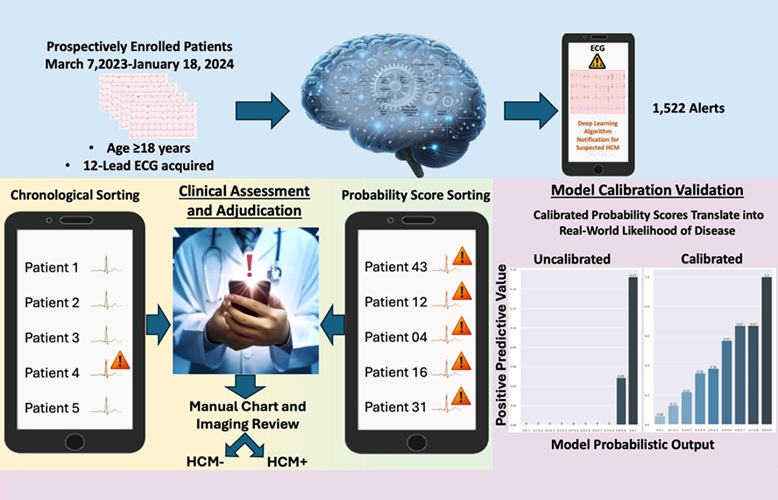High Sensitivity Blood Test Aids Emergency Diagnosis of Heart Conditions
|
By HospiMedica International staff writers Posted on 29 Nov 2023 |

Troponin, a protein released into the bloodstream during heart attacks or other heart injuries, has long been a focal point in medical diagnostics. Traditionally, various troponin blood tests have aided doctors in diagnosing heart conditions, especially in individuals experiencing chest pain and similar symptoms. Now, researchers have discovered a new method of measuring troponin levels, offering the potential to reduce future heart attacks in high-risk patients by 10% over five years. This advanced test is distinguished by its heightened accuracy in detecting even minimal troponin levels in the bloodstream, surpassing the capabilities of older tests.
Researchers at the University of Edinburgh (Scotland, UK) conducted an extensive study to evaluate the effectiveness of this innovative test. They analyzed health data from nearly 50,000 individuals with a suspected heart attack who visited ten emergency departments across Scotland between 2013 and 2016. Using general health records, the team tracked these individuals over five years. The new test identified over 10,000 patients with elevated troponin levels, indicative of heart injury. Notably, this high-sensitivity test detected subtle warning signs, identifying about 20% of these cases, which would have been missed by traditional tests.
The most significant impact of the test was observed in patients with heart muscle injuries caused by other cardiac conditions, such as heart failure, valve issues, and arrhythmias. Analysis showed that these patients experienced nearly a 10% reduction in subsequent hospital admissions and mortality over the following five years when tested with the new method, compared to those who underwent the older, less sensitive testing. This advancement in detecting heart injuries, particularly in cases that might have previously been overlooked, could enable more patients to receive specialized cardiac care, potentially preventing more severe health incidents in the future.
“In the past, clinicians could have been falsely reassured by the results of the less sensitive troponin test, discharging patients that appeared to not have heart disease,” said Dr Ken Lee, Clinical Lecturer in Cardiology at the University of Edinburgh. “This new high sensitivity test is the tool they needed, prompting them to look deeper and helping them to identify and treat both heart attacks and less obvious heart problems. In our trial, introducing this test led to an impressive reduction in the number of future heart attacks and deaths seen in this at-risk group.”
“Medical professionals in emergency departments need the most efficient and accurate tools to look after people,” added Professor Sir Nilesh Samani, Medical Director at the British Heart Foundation, which funded the study. “This particularly applies to those who arrive with a suspected heart attack. Such a time-sensitive and life-threatening condition requires the very best diagnostic tests. It is very encouraging to see that the new test trialed here is better at predicting long-term outcomes for these patients, whether they had a heart attack or a different kind of heart injury. This can lead to improved care for such patients.”
Related Links:
University of Edinburgh
Latest Point of Care News
Channels
Critical Care
view channel
Smart Bandage Monitors Chronic Wounds in Human Patients
A future smart bandage, envisioned as a "lab on skin," could assist both patients and caregivers by not only monitoring chronic wounds but also delivering treatment and accelerating the healing process... Read more
AI Identifies Patients with Increased Lung Cancer Risk Up To 4 Months Earlier
Earlier diagnosis plays a crucial role in improving the prognosis of cancer, as delays in starting therapy are associated with decreased survival rates. In most cases, cancer is first identified when symptoms... Read more
AI Algorithm Identifies High-Risk Heart Patients
Hypertrophic cardiomyopathy (HCM) is a complex condition characterized by the thickening of the heart muscle, which impairs the heart's ability to pump blood effectively. This forces the heart to work... Read more
Next Gen Hemodynamic Monitoring Solution Provides AI-Driven Clinical Decision Support
A new cutting-edge hemodynamic monitoring platform, equipped with predictive artificial intelligence (AI)-based algorithms, is designed to help clinicians proactively manage blood pressure fluctuations... Read moreSurgical Techniques
view channel
DNA Origami Improves Imaging of Dense Pancreatic Tissue for Cancer Detection and Treatment
One of the challenges of fighting pancreatic cancer is finding ways to penetrate the organ’s dense tissue to define the margins between malignant and normal tissue. Now, a new study uses DNA origami structures... Read more
Pioneering Sutureless Coronary Bypass Technology to Eliminate Open-Chest Procedures
In patients with coronary artery disease, certain blood vessels may be narrowed or blocked, requiring a stent or a bypass (also known as diversion) to restore blood flow to the heart. Bypass surgeries... Read more
Intravascular Imaging for Guiding Stent Implantation Ensures Safer Stenting Procedures
Patients diagnosed with coronary artery disease, which is caused by plaque accumulation within the arteries leading to chest pain, shortness of breath, and potential heart attacks, frequently undergo percutaneous... Read more
World's First AI Surgical Guidance Platform Allows Surgeons to Measure Success in Real-Time
Surgeons have always faced challenges in measuring their progress toward surgical goals during procedures. Traditionally, obtaining measurements required stepping out of the sterile environment to perform... Read morePatient Care
view channel
Portable Biosensor Platform to Reduce Hospital-Acquired Infections
Approximately 4 million patients in the European Union acquire healthcare-associated infections (HAIs) or nosocomial infections each year, with around 37,000 deaths directly resulting from these infections,... Read moreFirst-Of-Its-Kind Portable Germicidal Light Technology Disinfects High-Touch Clinical Surfaces in Seconds
Reducing healthcare-acquired infections (HAIs) remains a pressing issue within global healthcare systems. In the United States alone, 1.7 million patients contract HAIs annually, leading to approximately... Read more
Surgical Capacity Optimization Solution Helps Hospitals Boost OR Utilization
An innovative solution has the capability to transform surgical capacity utilization by targeting the root cause of surgical block time inefficiencies. Fujitsu Limited’s (Tokyo, Japan) Surgical Capacity... Read more
Game-Changing Innovation in Surgical Instrument Sterilization Significantly Improves OR Throughput
A groundbreaking innovation enables hospitals to significantly improve instrument processing time and throughput in operating rooms (ORs) and sterile processing departments. Turbett Surgical, Inc.... Read moreHealth IT
view channel
Printable Molecule-Selective Nanoparticles Enable Mass Production of Wearable Biosensors
The future of medicine is likely to focus on the personalization of healthcare—understanding exactly what an individual requires and delivering the appropriate combination of nutrients, metabolites, and... Read more
Smartwatches Could Detect Congestive Heart Failure
Diagnosing congestive heart failure (CHF) typically requires expensive and time-consuming imaging techniques like echocardiography, also known as cardiac ultrasound. Previously, detecting CHF by analyzing... Read moreBusiness
view channel
Expanded Collaboration to Transform OR Technology Through AI and Automation
The expansion of an existing collaboration between three leading companies aims to develop artificial intelligence (AI)-driven solutions for smart operating rooms with sophisticated monitoring and automation.... Read more















